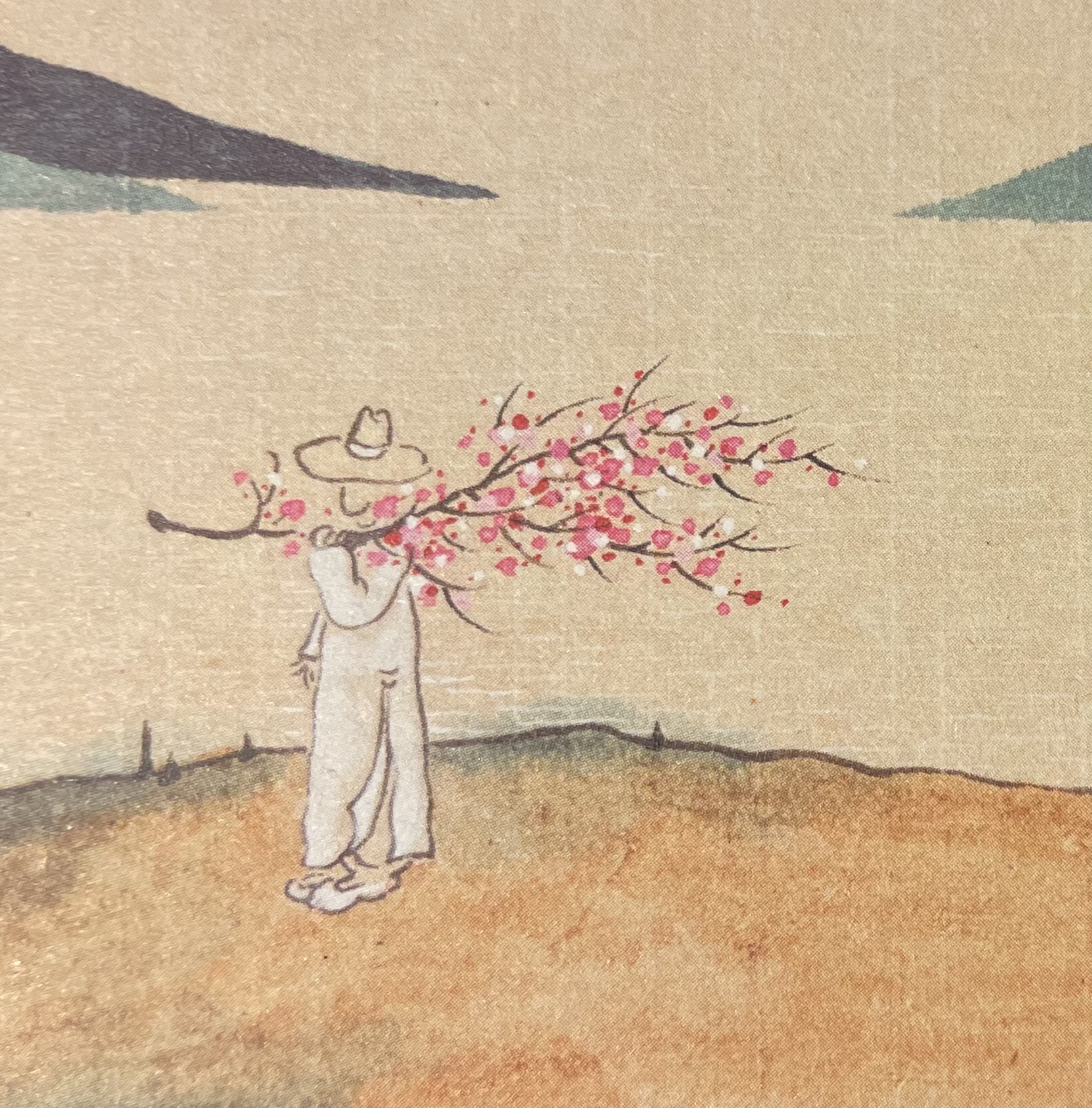The Other China
浪跡雲水中
This spring selection of work by Lao Shu, a Beijing-based artist who will be familiar to readers of China Heritage, starts with a self-portrait and doggerel verse followed by an excerpt from an essay titled ‘Mucking About’ 就是個好玩兒. The term ‘muck about’ or ‘self-indulgent play’ 玩兒 wán’r is an old Beijing usage that gained renewed currency in the 1980s.
The modern range of meanings of 玩兒 wán’r, a Beijing argot riff on the otherwise unobtrusive verb meaning ‘to play’, ‘muck around’, ‘expend energy on’, ‘enjoy [various] pastimes’, ‘to have a hobby’, flourished in particular due to the creative genius of Wang Shuo 王朔, novelist, raconteur, TV and screen writer who was himself a ‘master player’ 玩主 wánzhǔ. The verb 玩兒 wán’r featured in stories and films that universalised its popularity. I previously observed that:
Wanzhu is a Beijing term that Wang Shuo employed to characterize the protagonists of the novella The Operators. In Beijing dialect, the word wan (or wan’r, pronounced wa’r, literally “to play” or “fool around”) has the meaning of “to do” or “to work.” It often conveys a slightly self-deprecating or flippant tone, as in the expression used by glib litterateurs, wan’r wenxue, “to play at writing literature.” Apart from this more obvious use, it also appears in a variety of phrases such as wan’r bu zhuan (can’t handle or deal with), wan’r huahuo (play dirty), wan’r yinde (screw someone), wan’r wan (to be wiped out or finished), and even wan’r qu (get lost). It is known for its use in a classical Confucian expression: wan ren sang de, wan wu sang zhi [玩人喪德,玩物喪志], “to toy with people undermines morality; to play with curios undermines rectitude.” In the 1980s, the expression gained an ever wider currency and was used by many young people as a substitute for the vulgar verb gao [搞] (meaning a number of things from “to do,” “carry out” to “screw”). Gao was popularized by Mao Zedong, for whom it was a dialect verb common in his Hunan argot. His use of it led to the creation of such bizarre political slogans as gao geming (make revolution) and ba jingji gaoshangqu (get the economy going). The somewhat supercilious wan’r had none of the gung-ho enthusiasm of gao, and it became an ideal vehicle for the expression of the glib irreverence that increasingly typified youth culture in the early 1990s. The wanzhu was “a master of wan’r (fooling around).
— from an academic paper published in 1992, revised and included in In the Red: on contemporary Chinese culture, New York: Columbia University Press, 1999, p.74
玩兒 wán’r has enjoyed an unfettered, if commercialised, place in Chinese ever since, melding seamlessly with 把玩 bǎwán, another old verb with a range of meanings including ‘fiddle with’, ‘manipulate’ and ‘appreciate [an object, antique, etc]. Despite the best efforts of the authorities ‘to yuck people’s yum’, 玩兒 wán’r itself continues to encapsulate a serious form of playfulness, self-indulgence, worldly wisdom and even trickery. The heartfelt practitioners of 玩兒 wán’r may be world-weary, but they are not cynical. They can be as pointed as the most merciless social commentator or upstart online firebrand, though for the most part they keep their rapiers sheathed. They know what it takes to survive but they do so without betraying themselves or compromising too much their sardonic wit or breadth of humanity. Among other things, in dexterous hands, 玩兒 wán’r gives expression to The Other China, a contemporary global realm that also echoes the resilient escapism of earlier periods of autocracy, some of which we investigate in The Tower of Reading.
***
Lao Shu is a latter-day practitioner of 玩兒 wán’r, so much so that when Yu Qian (于謙, 1969-), one of China’s leading comic performers and story-tellers, published a collection of tall tales and stories under the title 玩兒 wán’r in 2013, he asked Lao Shu to illustrate it.
We mark April Fool’s Day 2024 with a selection of works by Lao Shu related both to the season and what, for Eastern Orthodox Christians, is known as Bright Week. We draw on Spring: drunk in flower’s shade 春:醉花陰, one of the four-volumes in Lao Shu’s 2017 collection 老樹畫畫·四季系列, as well as from the artist’s Weibo account, 老樹畫畫.
— Geremie R. Barmé
Editor, China Heritage
1 April 2024
April Fool’s Day
Easter Monday
***
More Lao Shu in China Heritage:
- Lao Shu’s Fall, 12 December 2023
- Lao Shu’s New Year, 4 January 2024
- Lao Shu’s Farewell to the Year of the Rabbit, 31 January 2024
- ‘Do you really think you can eat those pies in the sky?’ — Lao Shu embarks upon the Year of the Dragon, 29 February 2024
Yu Qian on YouTube:
- 我要反三俗 (和郭德綱)
- 皇帝的新裝
- 我愛醬油
- 養馬是我的樂趣 相聲興衰榮辱跟我沒什麼關係
See also:
- The People’s Republic of Wine, China Heritage Quarterly, March 2011
- Something In The Air — Watching China Watching (XXV), 8 June 2018
Lao Shu on Lao Shu
Translated by Geremie R. Barmé
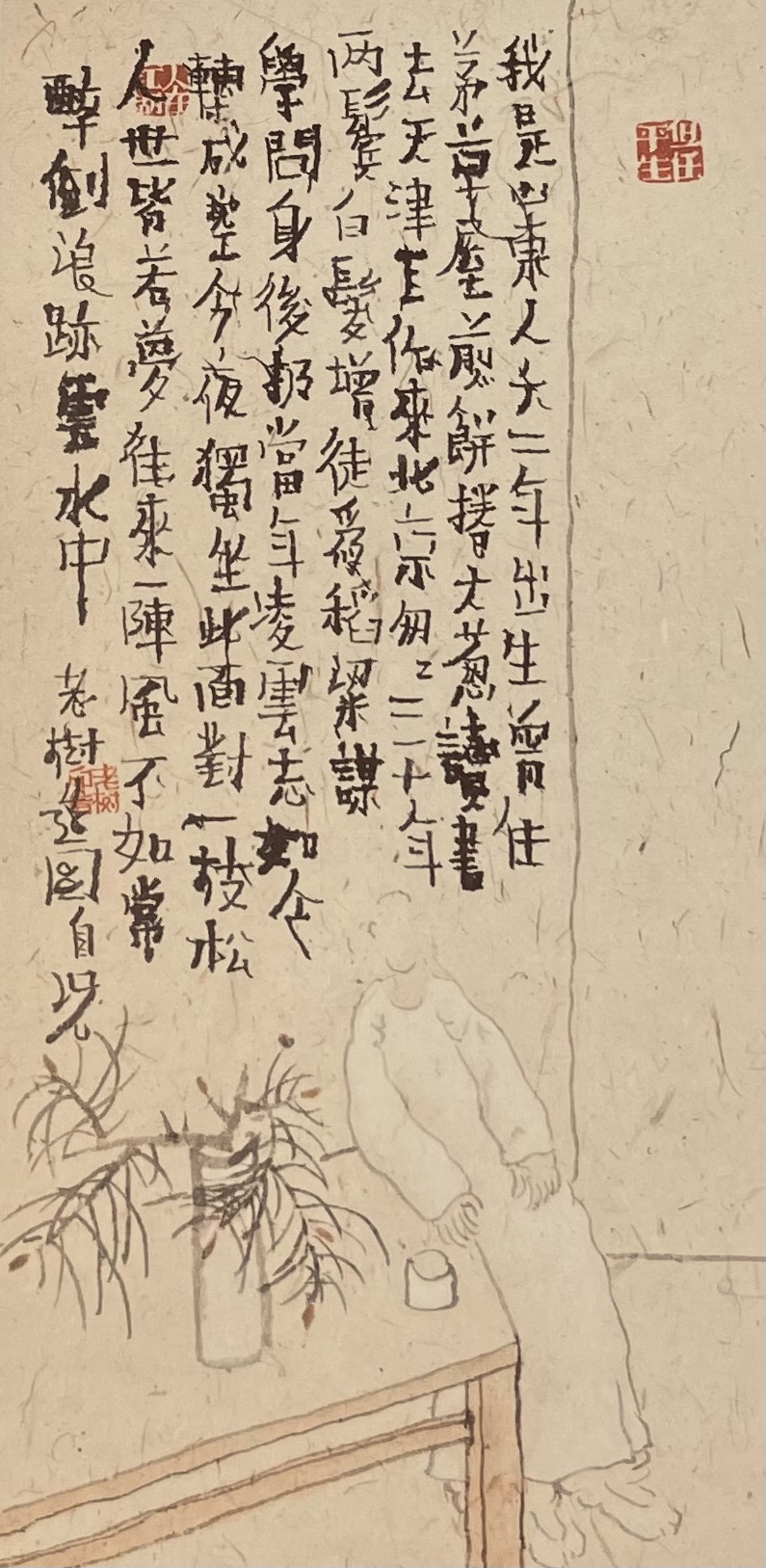
A native of Shandong, I was born in 1962 and grew up in humble circumstances eating common fare.
University in Tianjin was followed by thirty years working a job in Beijing leaving my temples flecked with grey. Eking out a living was pretty meaningless and in the process any real pursuit of learning had to take second place. Long ago my lofty aspirations were reduced to naught, so now I sit here contemplating this sprig of pine all alone.
Life is but a dream, our passage through it akin to a mere gust of wind.
Better to enjoy a drink or two and wander unfettered where you can.
***
Indulge your whimsical nature,
Enjoy the full thrill of your passions,
Create something unique
好好地玩兒,玩兒痛快了,玩兒出個花樣兒來
In the age in which we live there is still a clutch of individuals who actually know what ‘playfulness’ really means and they’re doing pretty well. They are happy and well adjusted; they don’t suffer from high blood pressure and have proved to be fairly resistant to the latest bout of swine flu.
Painting is as much a part of their everyday life as eating, sleeping and shitting; it’s a daily necessity, though one that they’re pretty relaxed about. Such a laidback approach allows them to make works of honest self-expression, things that are also a joy to see. It’s a world apart from that of those uptight and emotionally constipated Major Artists. In the eyes of the Big Names, the paintings of the everyday creators that I’m talking about count for nothing; they are malformed and their creators live meaningless lives. For their part, our artists don’t feel as though they need to do any kind of heavy lifting — you won’t find any profound social value, philosophical depth or historical significance in them. They don’t count in the rankings of all that post- or post-post-modern pile of semiotic post-structuralists whatnots. They don’t deconstruct anything and they don’t even have an ‘ism’ to call their own.
這個時代還是有一些特別好玩兒的人。他們活得挺快活,身體也挺健康,血壓也不高,對 H1N1 流感病毒很有抵抗力。畫畫兒對於他們來說,就跟吃飯睡覺屙屎一樣,不可或缺,但也稀松平常。這種鬆弛無礙的心境,讓他們的畫直見性情,看著就特好玩兒,跟那些一臉的正兒八經、其實是心中無限焦慮的偉大畫家們有所不同。在那些偉大的畫家們看來,這些個畫畫兒的簡直沒個正型兒,活得沒什麼意義。他們的畫兒也沒有什麼偉大的社會價值哲學價值歷史價值,根本就算不上是後現代後後現代符號學結構主義解構主義還有什麼其他的主義。
Though that’s not the way the artists I’m talking about see things. They think all of the painters and theoreticians who prattle on endlessly about the significance of contemporary life and the value of artistic pursuits that truly reflect it are simply full of crap. They regard them as being nothing more than self-indulgent blowhards who unconsciously reveal their ignorance. What our artists are interested in is painting, plain and simple. They focus on the unsullied enjoyment of things, finding playful diversion in what they do and exploring various ways to be as creative as possible. Let the pompous poseurs take responsibility for the magnificence of their vision and their creations. Our artists want to pursue the use of the useless and engage with things in their own playfully meaningful way. They want to lose themselves in their art. Or, to turn a line from Comrade Chen Sheng, their spiritual ancestor, on its head:
‘How can the lofty swan possibly understand the joy of lowly sparrows?’
[Note: Chen Sheng 陳勝 famously rebelled against the autocratic Qin empire in 209 BCE. Lao Shu reworks a well-known quotation about soaring ambition attributed to Chen in a biography written by the Han-dynasty historian Sima Qian. In February 2019, Sima Qian’s account of Chen’s uprising was reportedly removed from high-school text books. For more on The Use of the Useless, see The Tower of Reading.]
但是,這些畫家們不這樣看。他們覺得那些滿口的當代生活現實意義藝術價值的藝術家們理論家們都是在那裡瞎扯淡,純粹是吃飽了沒事兒乾在那裡瞎起勁,還捎带着暴露出自己根本就是個四六不通。他們就是要好好地畫畫兒,好好地玩兒,玩兒痛快了,玩兒出個花樣兒來。那些個莊嚴偉大的責任,就讓那些偉大的人物去擔當吧!他們只想做個於社會無用的人,一個純粹好玩兒的人,一個畫起畫兒來忘乎所以的人。套用他們一位古代親戚陳勝同志說的話來回答,就是:鴻鵠安知燕雀之快活哉?
— 選自老樹,“就是個好玩兒”,《春:醉花陰》,上海書畫出版社,2017年,第68-69頁。
Lao Shu’s Spring, 2024
Selected and translated by Geremie R. Barmé
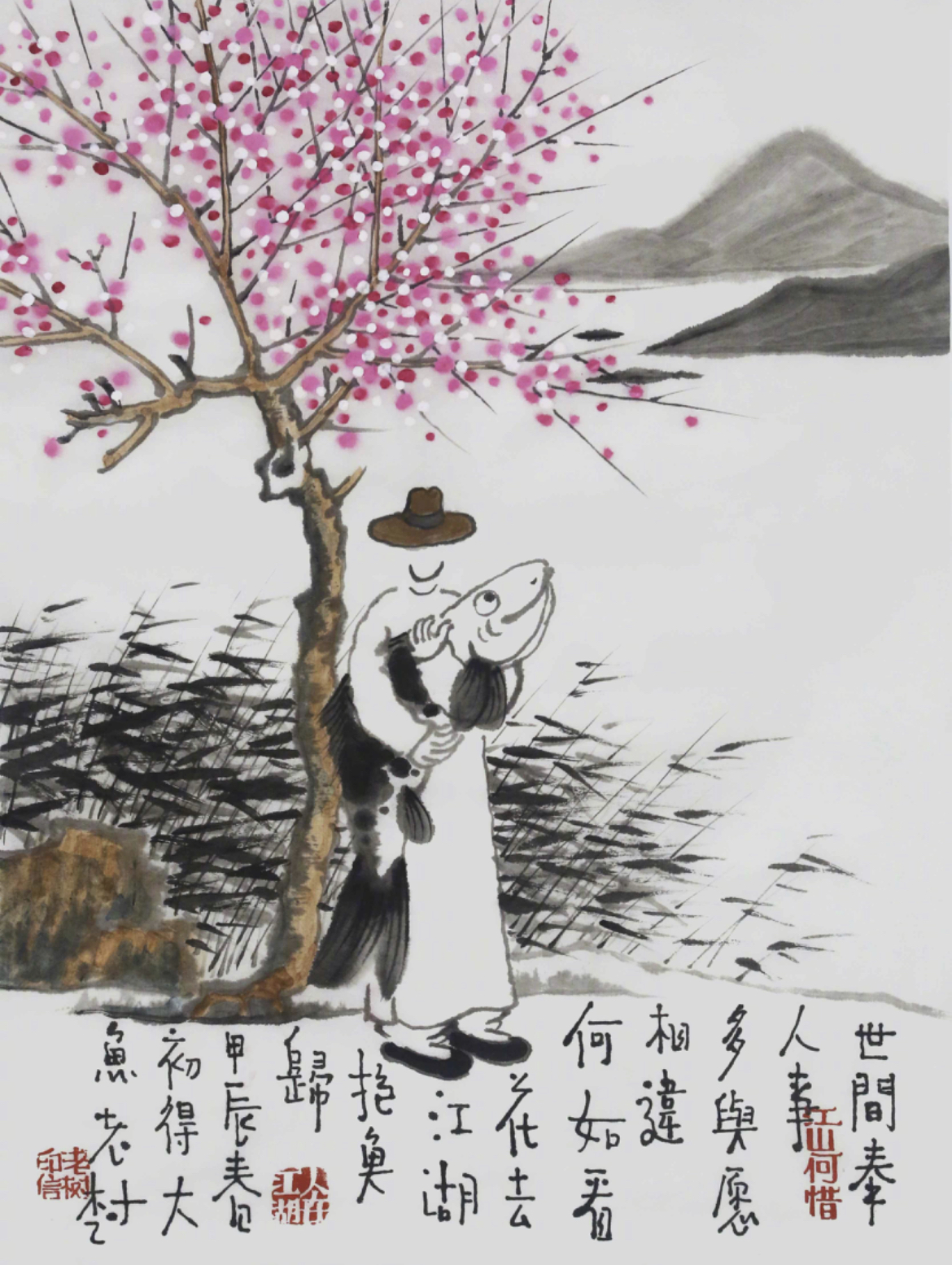
Embroiled in the pursuit of worldly tasks
Generally things tend not to go your way.
Might as well enjoy the blossoms when you can
And return home with a fine catch.
— Lao Shu, after catching a big fish, spring, Jiachen Year of the Dragon
Published on 3 March 2024
***

Spring arrives earlier in the South and
They say the plums are in full flower.
Sadly, it’s different for us here in the North,
And I’m reduced to dream-searching online.
— Lao Shu, painted on Insects Awakening, Jiachen Year of the Dragon
Published on 7 March 2024
***
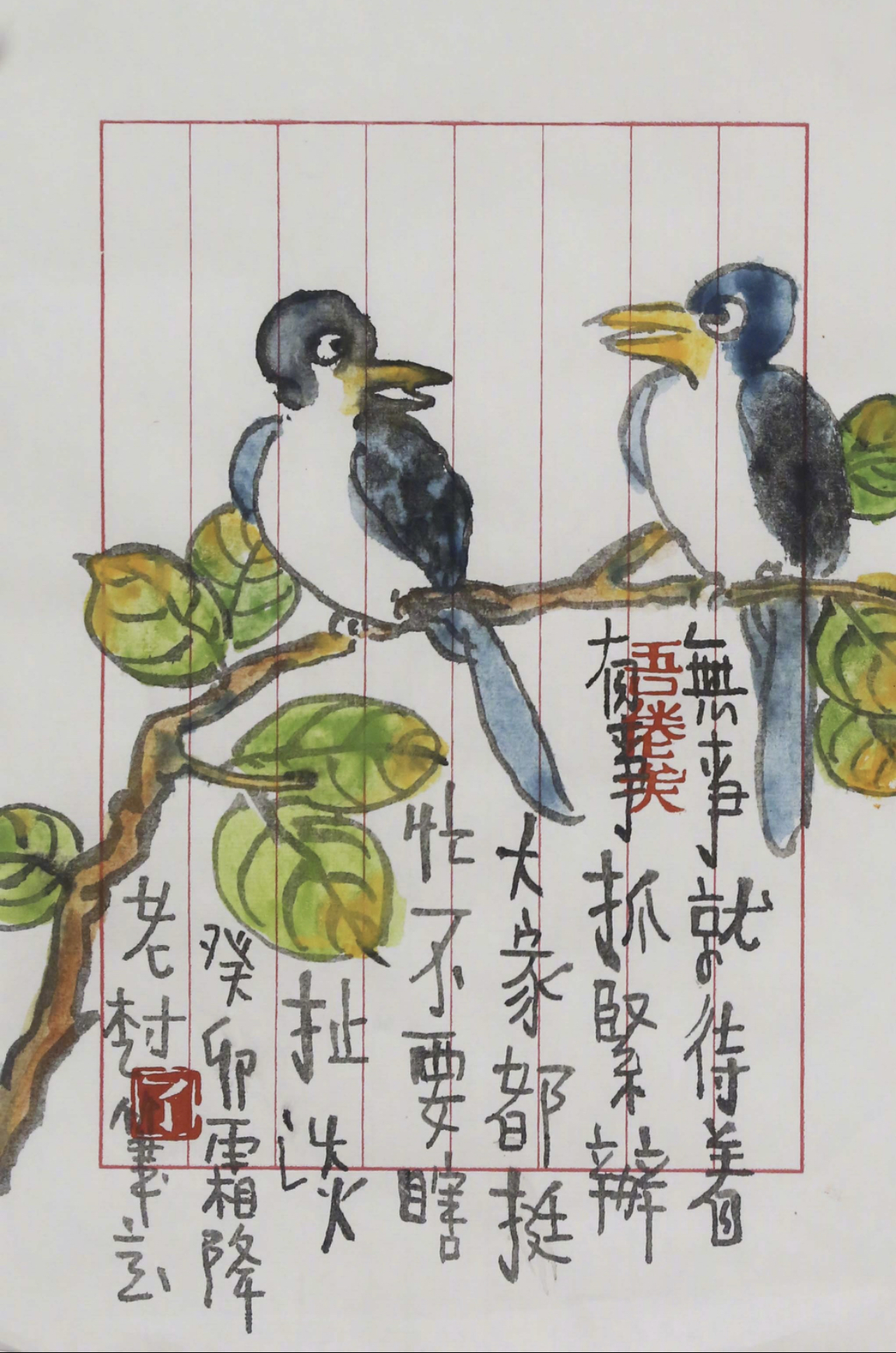
If nothing’s going on, just chill;
Got things to do, then get on with it.
Everyone’s so damned busy these days,
No time to waste to have a yarn.
— Painted by Lao Shu on Frost’s Descent, Jiachen Year of the Dragon
Published on 9 March 2024
***
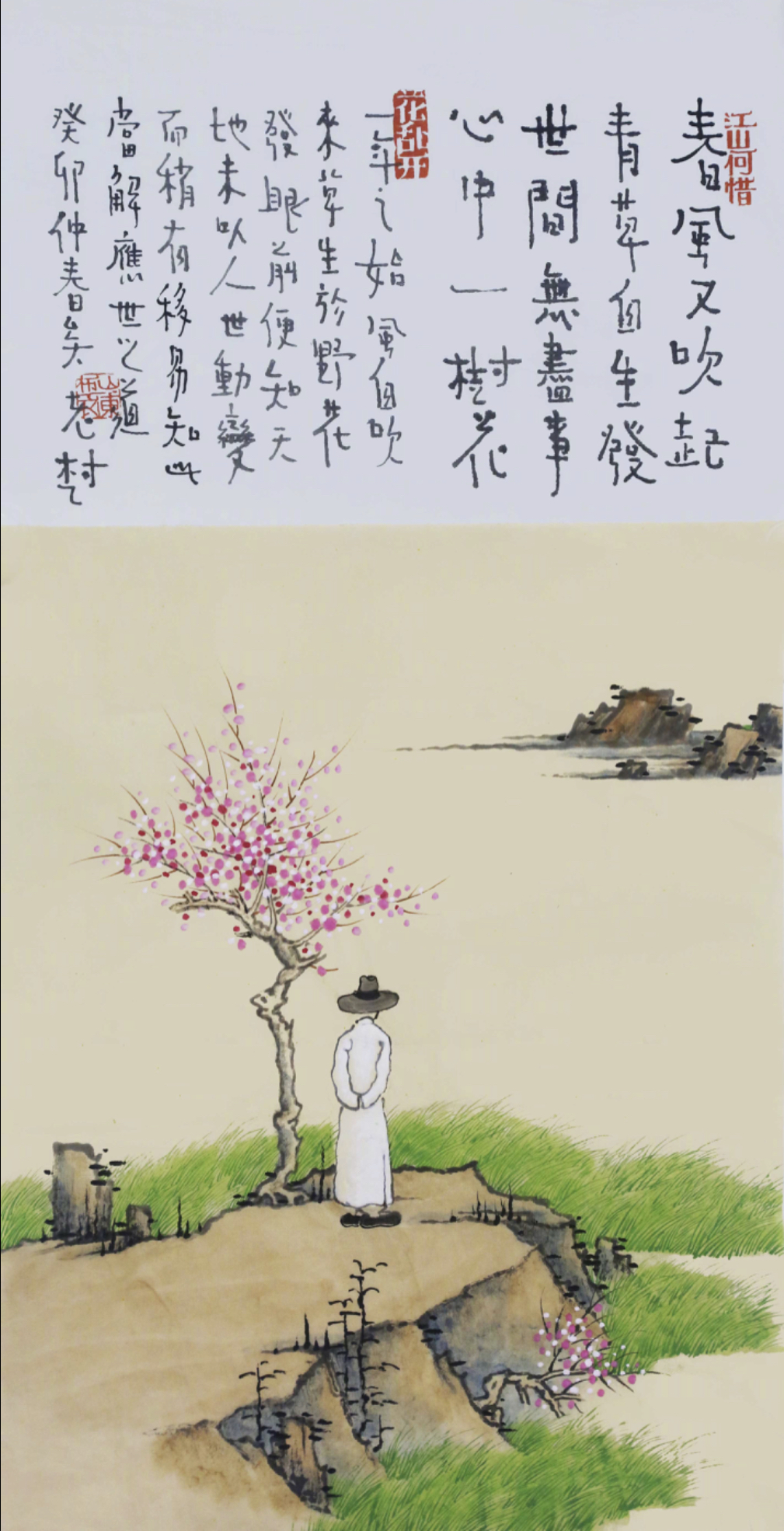
Spring winds stir anew and
The tender grasses sprout green,
While no end of things may be going on
In my heart grows that blossoming tree.
— the winds stir at the beginning of the year just as wild grasses and flowers flourish. It is a reminder that the workings of Nature are unmoved by our petty antics. Nature teaches us how to cope. Lao Shu, Mid-Spring, Jiachen Year of the Dragon
Published on 10 March 24
***
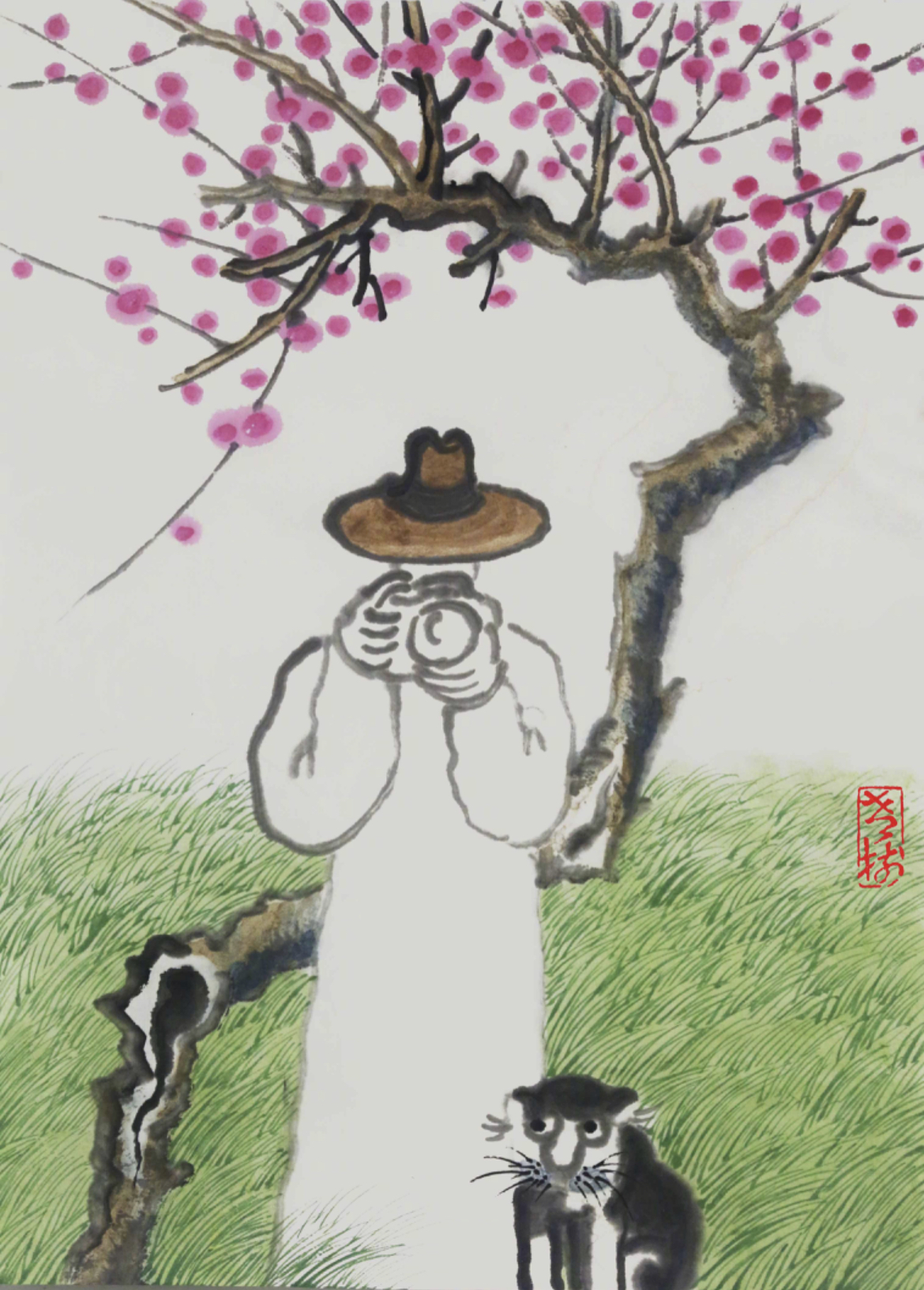
你說春風多溫暖,你看花開多嬌艷。
四處游走拍照片,過後一張找不見。
See, how warm the spring zephyr;
How charming, too, the blossoms.
Having snapped photos left and right
In the end, I can’t find any of them.
Published on 19 March 2024
***
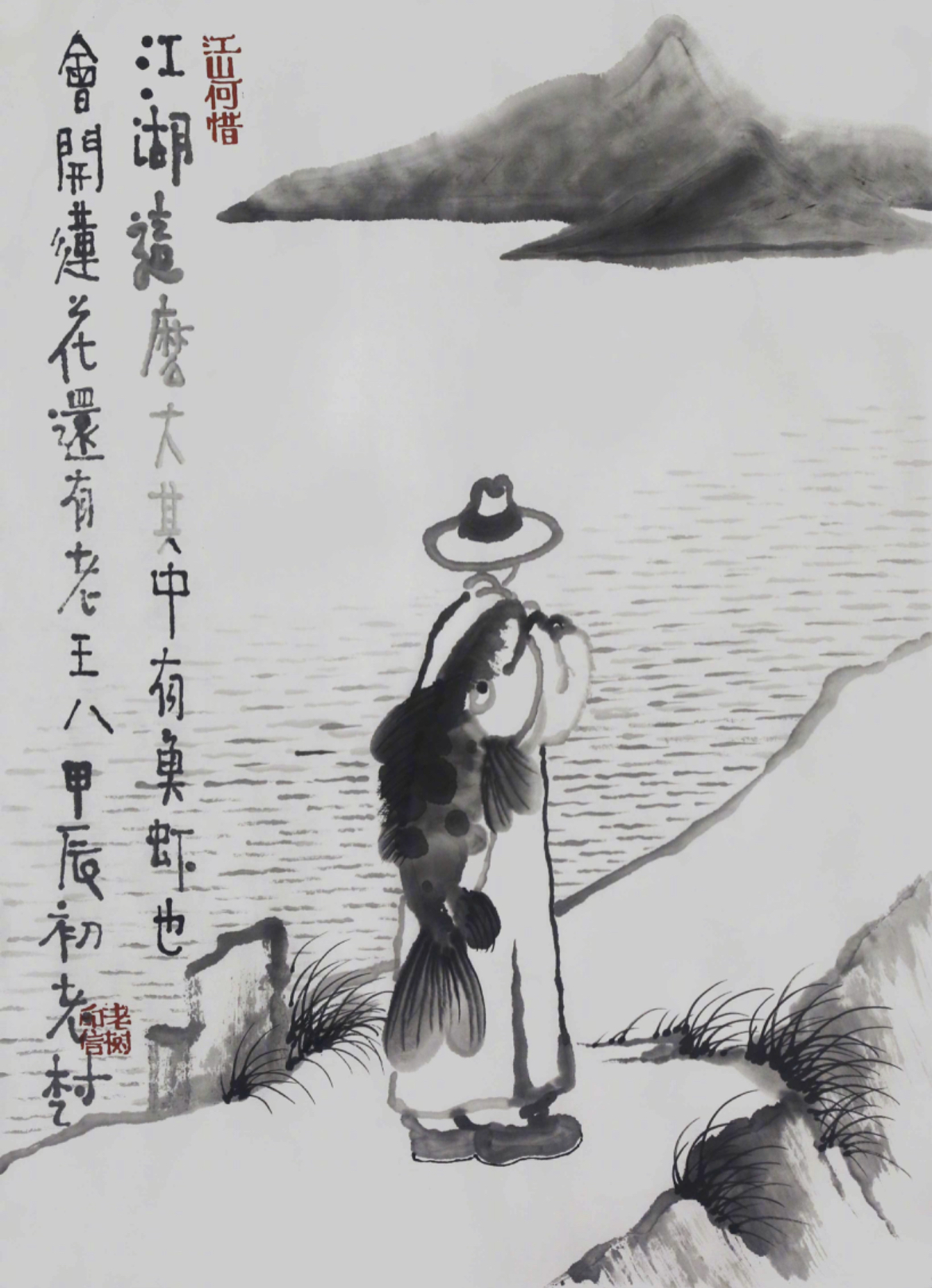
江湖這麼大,其中有魚蝦,
也會開蓮花,還有老王八。
The wilds are vast, fish and prawns abound.
Lotus, too, will flower soon enough
Nor is there any lack of turtles.
[Note: 老王八 lǎo wángba also means ‘useless bastards’.]
— Lao Shu, at the start of the Jiachen Year of the Dragon
21 March 2024
***
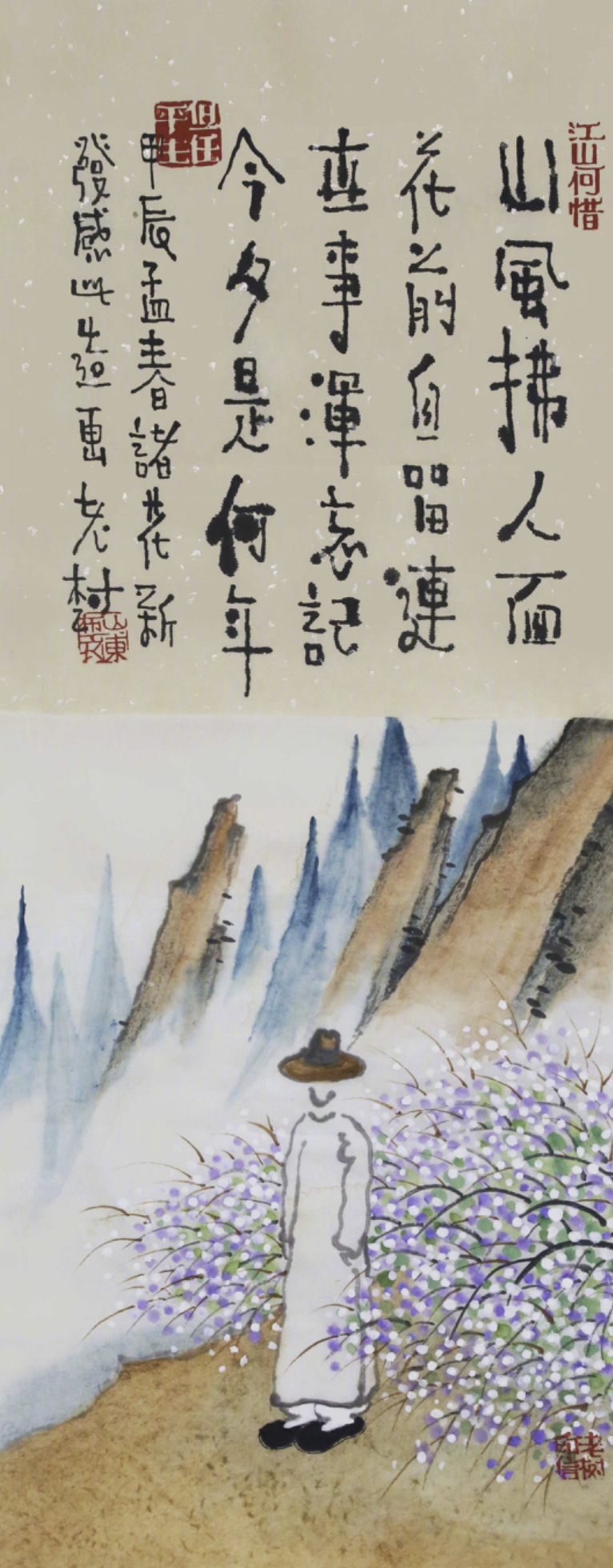
The mountain breeze caresses your face
As you linger to take in the blossoms.
Forgotten are all your worldly cares,
What day is this? — a moment in eternity.
— Painted in response to the fresh blossoms of the season
First Month of Spring, Jiachen Year of the Dragon
Published on 22 March 2024
***
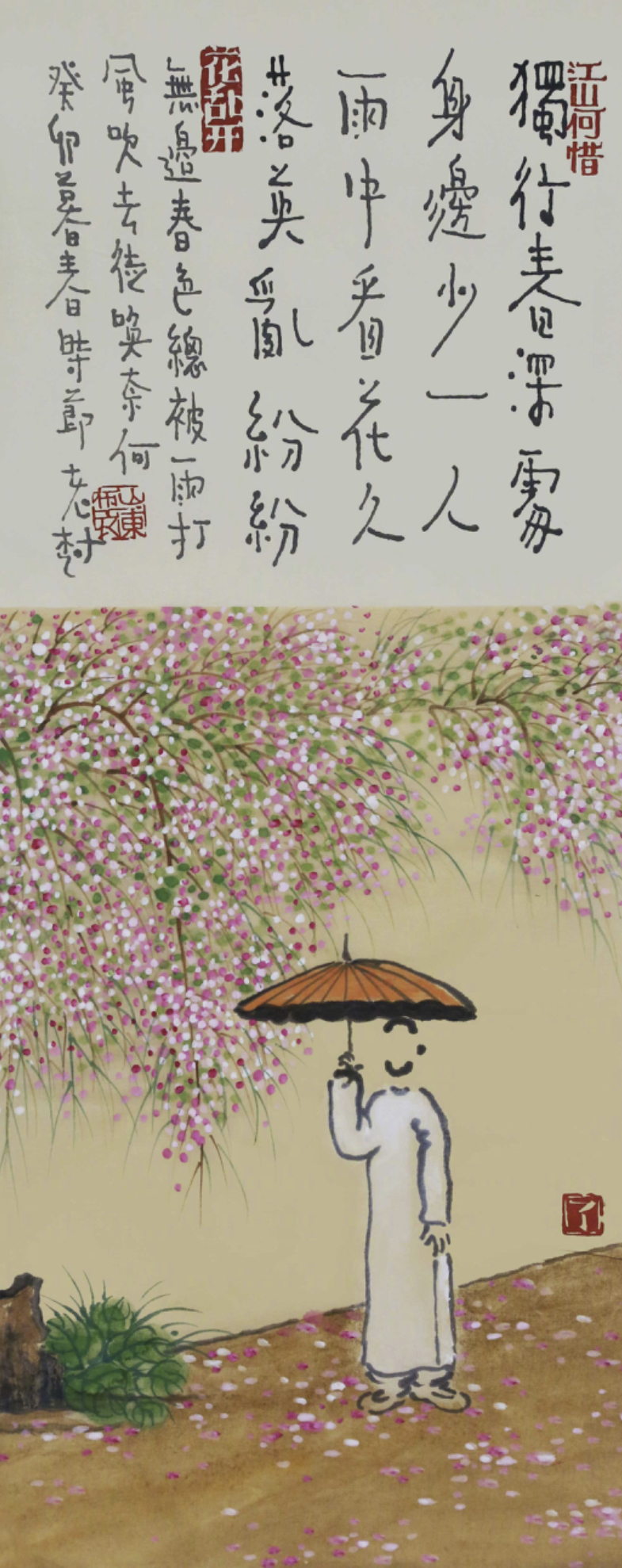
Wandering alone in the depths of spring
No one there to accompany me.
Lingering to appreciate the flowers
The petals fall in swirling flurries.
— The colours of spring are always undone by wind and rain. There’s nothing for it.
Lao Shu, late spring in the Guimao Year of the Rabbit
25 March 2024
***
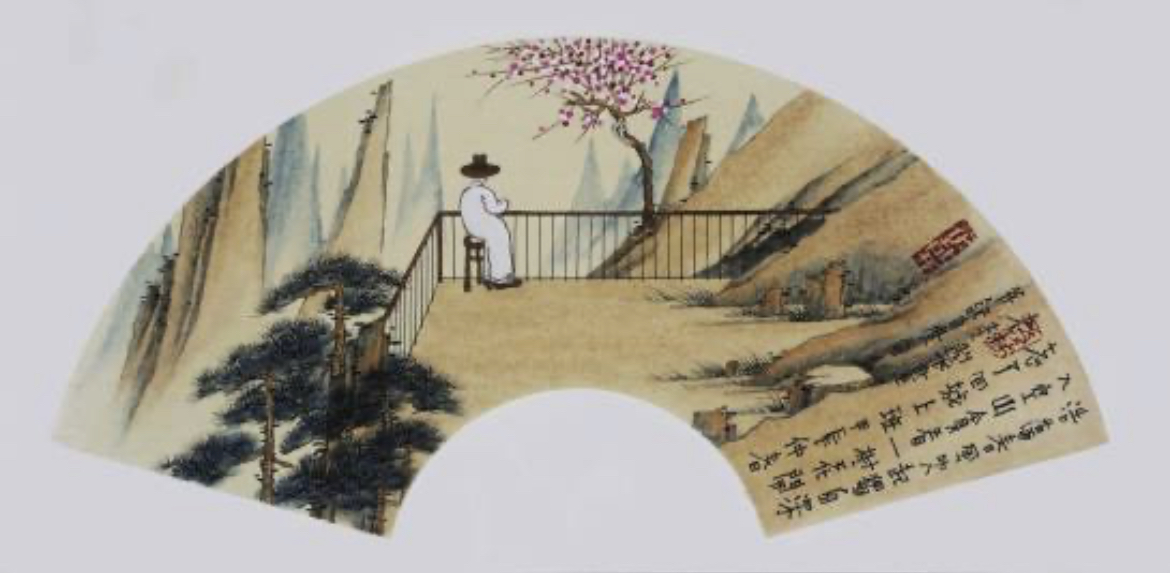
The spring wind stirs as
I venture deep into the hills
Eyes hungry for blossoming trees
Without a thought of turning back
— Lao Shu, Mid-Spring Jiachen Year of the Dragon
Published on 26 March 2024
***
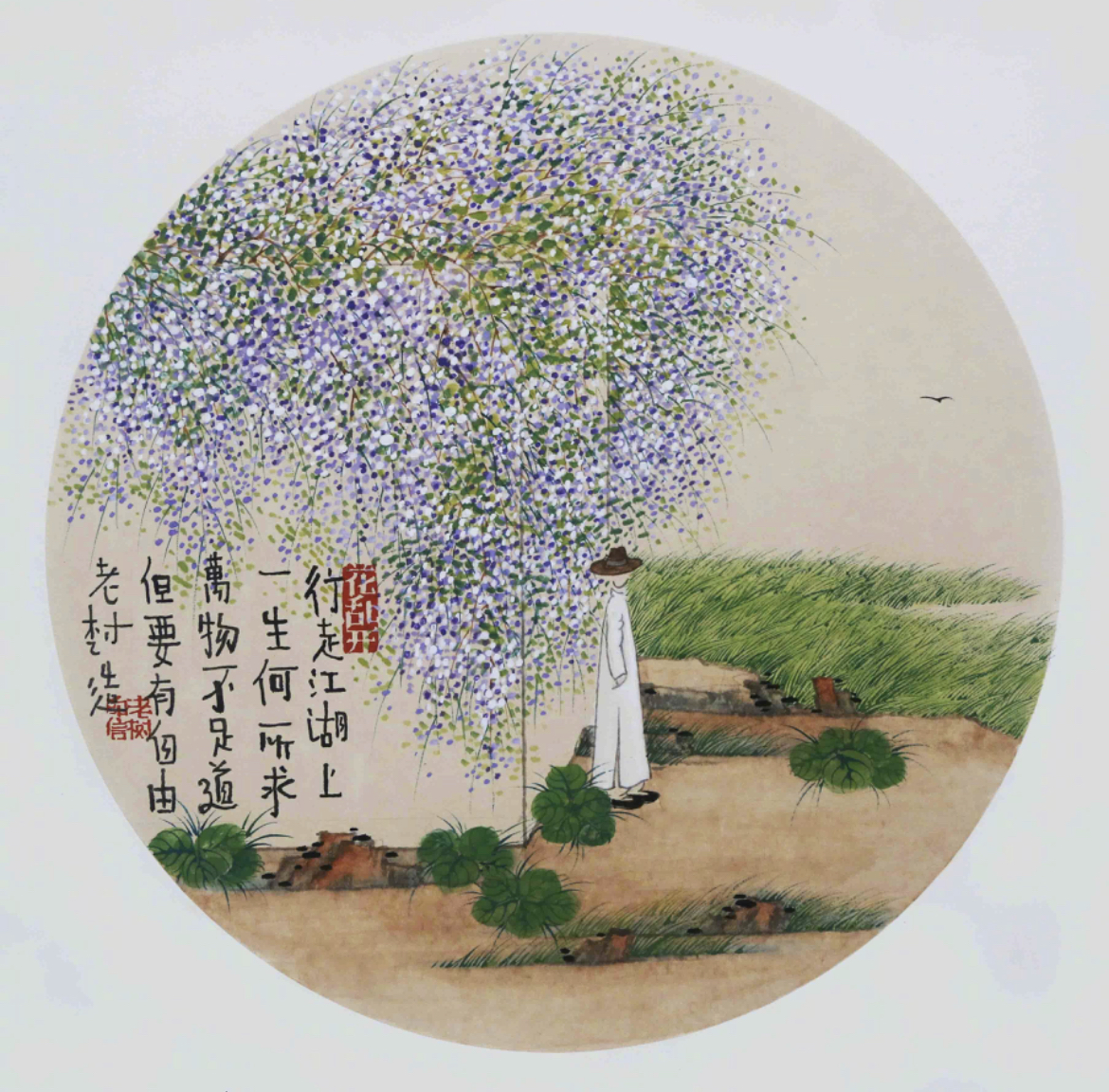
To set out for a life in the wilds
What more could one hope for?
As long as you’re free,
Nothing else is worth a fig.
— the work of Lao Shu
Published on 30 March 2024
***
Source:
***
